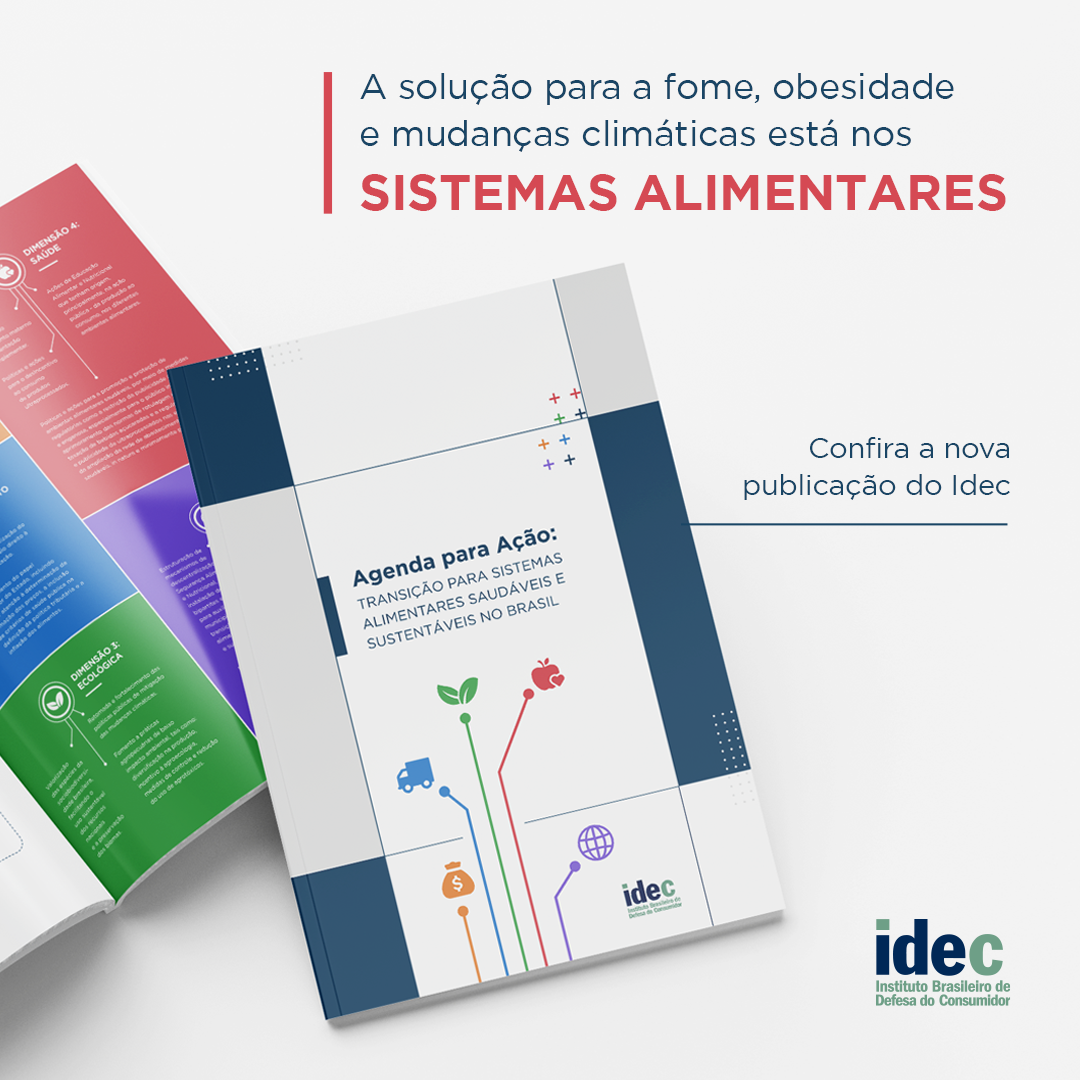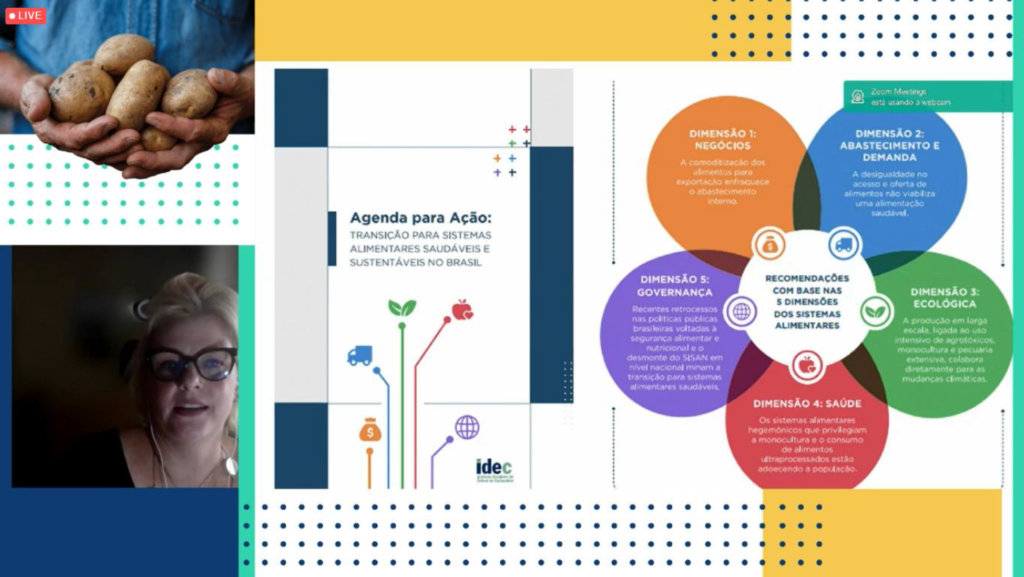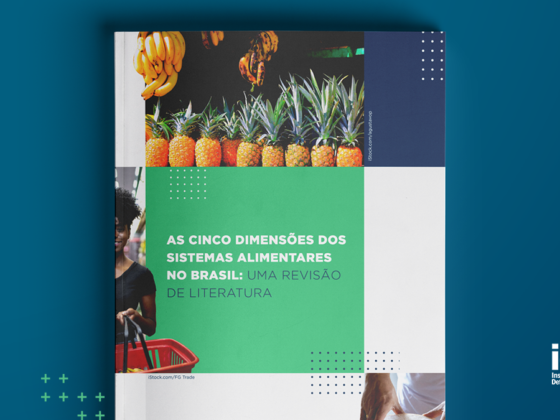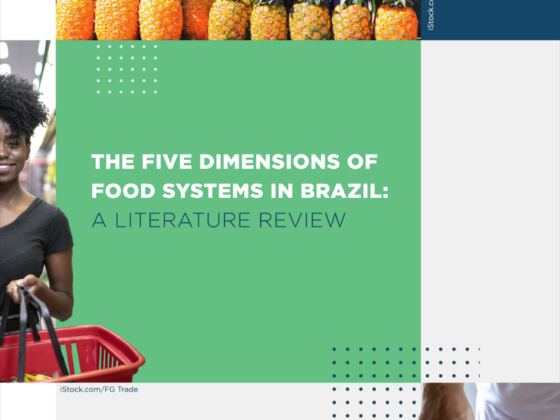Idec launches agenda for action to promote a transition in food systems
Document presented in an international webinar brings a series of recommendations and paths to encourage healthier and more sustainable ways of producing, distributing and consuming food

The solution to hunger, obesity and climate change lies in food systems. To promote this debate, Idec (Brazilian Institute for Consumer Protection) and Colansa (Latin American and Caribbean Nutrition and Health Community of Practice) organized the online seminar “Food Systems: debating advances and paths for Latin America”, which took place on Friday (25).
The event marked the launch of a transition agenda for healthy and sustainable food systems in Brazil, the result of a year of work and research by Idec on the subject with strategic partners.
Divided into five dimensions – business, supply and demand, ecological, health and governance – the publication presents 52 recommendations for changes that must be made, and how to make them, to transform the way food is produced, distributed, offered and consumed.
“The way these processes have been carried out in recent decades is leading to a ill population and environment, accelerating the impacts of climate change and undermining the fundamental right to adequate and healthy food”, said Carlota Aquino, Idec Executive-Director.
The event also presented the main results of new research on food systems carried out by the State and Society Studies Centre of Argentina and Universidad Alfonso Ibáñez, in Chile, partners of Idec in Latin America.
Additionally, representatives of the International Development Research Centre, the Wellcome Trust, the government of Argentina, United Nations agencies, academia and civil organizations in Latin America participated in the event. Watch the full webinar here.
Paths to transition
Based on an extensive literature review that highlights the connection between hunger, obesity and climate change, the “Agenda for Action: transition to healthy and sustainable food systems in Brazil” is a call to decision-makers and rights holders to act in a convergent and articulated way through feasible solutions, based on scientific evidence, which can strengthen, expand and sustain public policies based on promoting the right to food and protecting the health of populations and our planet.
“Our main objective is for people to be able to choose better the food they consume. For that, we have to work on public policies”, highlighted Janine Coutinho, coordinator of the Healthy and Sustainable Food Program at Idec.
“It is urgent to eradicate hunger and food and nutritional insecurity in more than half of the Brazilian population, with measures to combat inequality and poverty. Just as important is the work with the complex network of actors, processes and interactions involved from the cultivation, processing, distribution, consumption, and disposal of food – a network that depends and interacts between themselves.”

According to Janine, accelerating the change towards sustainable and healthy food systems requires joining forces from different sectors and organizations committed to human rights. “The right to health and the right to choose adequate food must take precedence over economic and commercial interests,” she explained.
Idec worked on three major fronts that led to the publication of the Agenda for Action. It gathered scientific evidence, implemented a set of actions to communicate to consumers about food systems, and influenced global forums such as the UN Summit on Food Systems and the 26th UN Climate Conference.
The webinar was marked by the connections made between the transition agendas of Argentina and Chile, which have also developed initiatives in this direction.
The Center for State and Society Studies in Argentina and the Universidad Alfonso Ibáñez in Chile have, separately, reviewed dozens of relevant publications on healthy and sustainable diets, relating food, nutrition and health. Public policies were also considered and analyzed, in addition to interviews with key actors from different sectors.
According to Greg Hallen, Senior Specialist in the Climate-Resilient Food Systems Program at the International Development Research Center (IDRC), “this work around the Agenda for Action project has also really managed to build bridges between the public health community and the communities focused that are focused on climate change, environmental sustainability and sustainable agriculture”.
For Modi Mwatsama, Head of Interventions, Climate & Health at Wellcome Trust, healthy and sustainable food systems are not yet seen as a priority. “Now, partner networks are ready to collaborate together. This project ensured that a series of actors from different sectors came together to start analyzing the challenges and opportunities for systems transition in the Latin American and Caribbean region”.
A date to celebrate
The webinar agenda was also dedicated to celebrating the one-year anniversary of Colansa, which is the Latin American and Caribbean Nutrition and Health Community of Practice, made up of 160 individuals and 30 organizations from 18 countries.
Since its creation in March 2021, Colansa has actively contributed, through technical meetings, seminars and publications, to the discussion of fundamental themes for facing challenges common to most Latin American and Caribbean countries, such as: frontal nutrition labeling of food, regulatory measures, promotion of healthy eating habits, food guides, among others, which lead to paths for the transition to healthy and sustainable food systems.
During the webinar, the coalition of partners presented the achievements of 2021 and reinforced, based on the testimonies of network members, on the importance of strengthening coalitions of partners and actors to promote the food systems transition.
“Colansa still has a long way to go considering the regional and international contexts, which point out challenges and obstacles to ensure healthier and more sustainable food systems. I highlight here the need to move forward with the discussion of industry interference in public policy decision-making processes, which lean towards economic interests”, said Ana Paula Bortoletto, nutritionist at Idec and Colansa member.
Also a member of Colansa, representing the Healthy Latin America Coalition (CLAS), Beatriz Champagne recognized that one of the main achievements was to unite the academic, research, and political advocacy communities. “Colansa’s effort through training, better communication, positioning, construction of joint spaces, all of this helped us to bring the two communities closer together”.
Now, Colansa faces the challenge of consolidating and expanding its operations by advancing in new paths and themes. Some of them are considered fundamental by the global situation, such as the impacts – and multiple unfoldings that are yet to come – of the covid-19 pandemic, and others, such as, for example, the need to discuss instruments and mechanisms for the prevention of conflicts of interest in food and nutrition security policies and programs.



